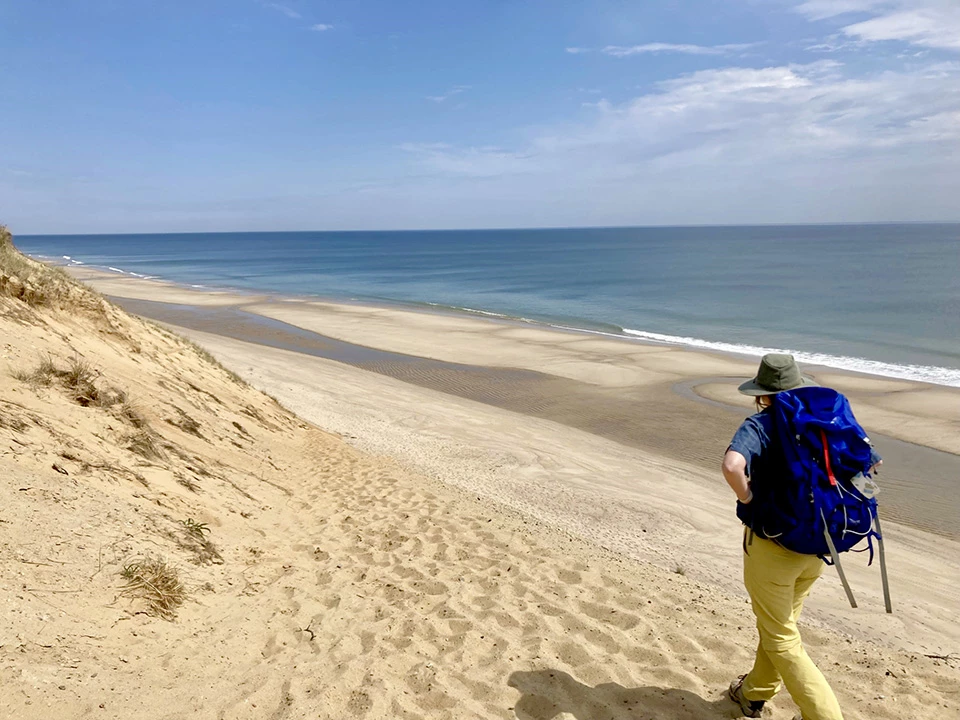
Koryna Boudinot About Research PermitsCape Cod National Seashore supports many types of research in the park, including in the natural and social sciences. A permit is required for all non-NPS scientists and scholars to complete research within park boundaries. The Research Permit and Reporting System (RPRS) is utilized by Cape Cod National Seashore to screen proposed research activities within the park. Researchers should submit an RPRS application at least 60 days prior to their desired start date.For more information on the NPS Research Permit and Reporting system and research in National Parks, please review the information found on the NPS Research Permits page and NPS Research Policies and Guidance page. Review the archive of Investigator's Annual Reports to learn more about research projects past and present. You can also view Cape Cod's Research Media and Products and Resource Hot Topic articles, to learn more about research in the park, including some projects that have been conducted by permitted researchers! If you are curious about research projects that support current management needs, please see the dropdown below. It can be mutually beneficial for individuals who are seeking research permits to complete projects that align with resource or management questions that the park has not yet been able to address. Topics of interest may be updated here as they arise.
You can email Geoff Sanders, Chief of Natural Resources, to inquire about about the park's current research interests or if you have further questions. Your project does not need to align with these topics to be considered. 
NPS / Katy Perrault Research submits completed Research Permit Application through the RPRS system. Permit Coordinator receives the permit application. Permit application is sent for Review by Natural Resource Management and Science staff. NRMS Staff may contact Researcher for more information or clarification; the scope of work may be approved in full, approved with changes, or denied. If approved by NRMS, the permit is sent to the Cape Cod National Seashore Superintendent for final park approval and signature. Researcher sends signed permit back to Park Coordinator. Park Coordinator sends fully executed permit to researcher. Researcher is assigned a Point-of-Contact (POC) at Cape Cod National Seashore. Researcher contacts assigned POC before beginning field work. All coordination should be done through the POC. Researcher must carry signed permit with them when conducting field work and inform park staff when they will be working in the park. Researcher provides annual and final reports. If the proposed research involves... A Standard Operating Procedure and information about the use of Unmanned Aircraft Systems is in progress. You can reach out to Geoff Sanders, Chief of Natural Resources Management and Science, with questions or to inquire further.
Scientists wishing to collect or voucher specimens for long-term storage need to get approval prior to starting research. Due to issues with managing and curating collections, Cape Cod does not usually approve research projects wishing to do a large volume of collection or specimen vouchering. All collections must be approved ahead of time and must be stored in a NPS approved facility. For more information about collections, please see: Proposing to Collect Specimens - Science (U.S. National Park Service) or reach out directly to the Permit Coordinator.
If proposed research involves the handling of or direct interaction with wildlife, National Park Service Institutional Animal Care and Use Committee (IACUC) approval is required prior to the approval and issuance of a NPS Research Permit. National Park Service IACUC responsibilities fall under the Biological Resources Division. Learn more about this process and submission forms on the IACUC page.
Common QuestionsHousingResearcher housing is not available through Cape Cod National Seashore. Researchers must secure their own accommodations.Commercial Applications of ResultsIf a permitted researcher subsequently discovers a potential commercial application for the research results, such commercial application may be pursued only upon securing supplemental written authorization from NPS in the form of a benefits-sharing agreement. NPS enters into such agreements with federal or non-federal entities, but not with individuals. For more information, please see: Benefits Sharing - Science (U.S. National Park Service).Academic Research in Cultural ResourcesIf you are a professor or scholar interested in academic research in cultural resources, like history or archaeology, please contact the Cultural Resources Program Manager. You can contact the current Cultural Resources Program Manager, Bill Burke, through email or call Salt Pond Visitor Center for contact information.Collections vs. Specimen CollectionsSpecimens may be collected during the course of research and taken to the researcher’s workplace for analyses, as long as analyses will be conducted within a reasonable amount of time and the specimen will be destroyed or discarded during or after analyses. Long-term storage of specimens for future analyses is not permitted. A “specimen” is any kind of sample collected (biotic or abiotic), including water, soil, or any organism. Scientists wishing to collect or voucher specimens for long-term storage need to get approval prior to starting research. See Collections drop-down above for more information. |
Last updated: April 28, 2025
